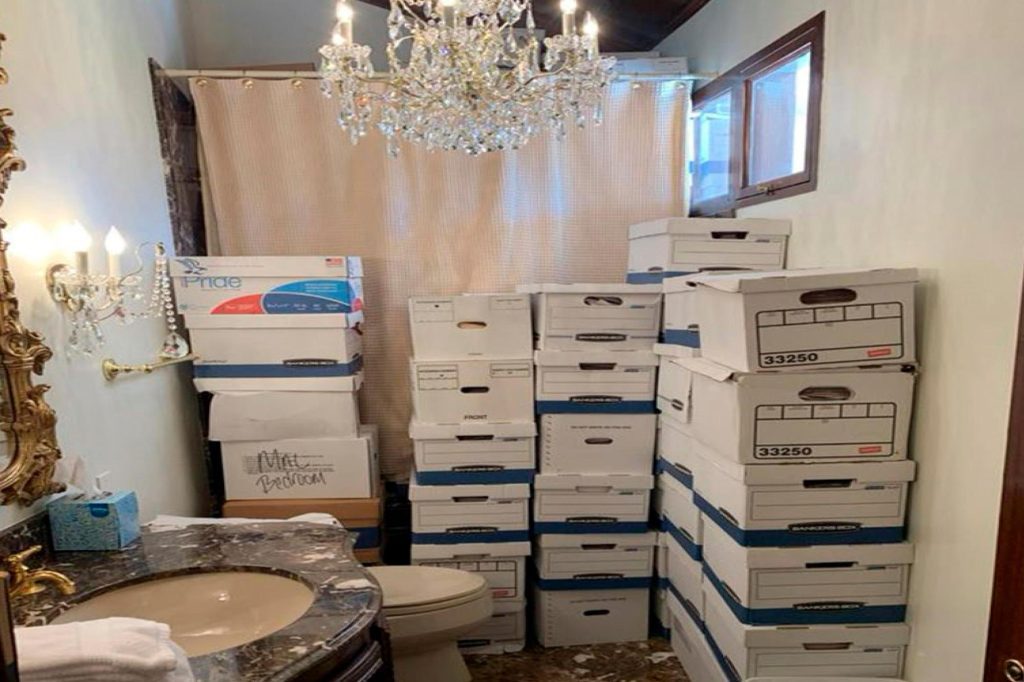By ERIC TUCKER, ALANNA DURKIN RICHER and TERRY SPENCER (Associated Press)
FORT PIERCE, Fla. (AP) — Donald Trump arrived at a federal courthouse in Florida on Thursday. This is where a judge will listen to arguments about the criminal case against the former president. The case accuses him of keeping classified documents at his Mar-a-Lago estate after leaving the White House.
The motorcade carrying the 2024 Republican presumptive presidential nominee arrived shortly before the hearing was set to begin in front of U.S. District Judge Aileen Cannon, who was nominated to the bench by Trump.
The argument is focused on Trump's team's interpretation of the Presidential Records Act. They say it allowed him to classify the documents as personal and keep them after his presidency.
Special counsel Jack Smith's team, on the other hand, says the files Trump is charged with having are presidential records, not personal ones. They argue that the statute does not apply to classified and top-secret documents like those kept at his Mar-a-Lago estate in Florida.
Prosecutors wrote in a court filing last week that the Presidential Records Act does not give Trump immunity from the law, the right to unilaterally declare highly classified presidential records as personal, or protection from criminal investigations. They also argued that Trump cannot obstruct a federal investigation with impunity.
It's not certain when Cannon might make a decision, but the result will determine whether the case continues or whether, as Trump's lawyers expect, it is dismissed before going to a jury — an unusual action for a judge.
Cannon is also expected to listen to arguments on Thursday about a separate but related motion from Trump's team. They claim that the statute forming the majority of the criminal charges, which makes it a crime to willfully retain national defense information, is unconstitutionally vague when applied to a former president.
Given that the legal team has frequently invoked the statute since the FBI's search of Mar-a-Lago in August 2022, it's not surprising that defense lawyers are seeking the case's dismissal based on the Presidential Records Act.
The law, enacted in 1978, requires presidents to transfer their presidential records to the U.S. government after leaving office, specifically to the National Archives and Records Administration. However, they are allowed to keep personal records, such as diaries and notes that are purely private and not prepared for government business.
Trump's lawyers have stated that he designated the records he took to Mar-a-Lago as personal property. Prosecutors disagree and say they included top-secret information and documents related to nuclear programs and the military capabilities of the U.S. and foreign adversaries.
Cannon has previously indicated that she sees Trump's status as a former president as setting him apart from others who have held onto classified records.
After the Trump team sued the Justice Department in 2022 to retrieve his records, Cannon appointed a special master to independently review the documents taken during the FBI's search of Mar-a-Lago. However, a federal appeals court later overturned this appointment.
More recently, even while ruling in favor of Smith’s team on a procedural question, Cannon pointedly described the case as the “first-ever criminal prosecution of a former United States President — once the country’s main person in charge of classifying many documents that the Special Counsel now wants to keep from him (and his cleared counsel) — in a case without charges of transferring or giving away national defense information.”
Trump faces 40 felony counts in Florida that accuse him of purposely keeping dozens of secret documents and refusing government demands to return them after he left the White House. Prosecutors in recent court documents have emphasized the extent of criminal behavior that they expect to prove at trial, saying in one that “there has never been a case in American history in which a former official has engaged in conduct remotely similar to Trump’s.”
They claim, for example, that Trump intentionally held onto some of the nation’s most delicate documents — only giving back a small part of them when asked by the National Archives — and then encouraged his lawyer to hide records and lie to the FBI by saying he no longer had them. He’s also accused of getting staff to erase surveillance footage that would show boxes of documents being moved around the property.
The hearing is the second this month in the case in Florida, one of four prosecutions Trump faces as he seeks to regain the White House this year. Cannon heard arguments on March 1 on when to schedule a trial date, but has not immediately ruled. Both sides have suggested summertime dates for the trial to start.









